Trini-Lebanese survivor recalls Beirut blast
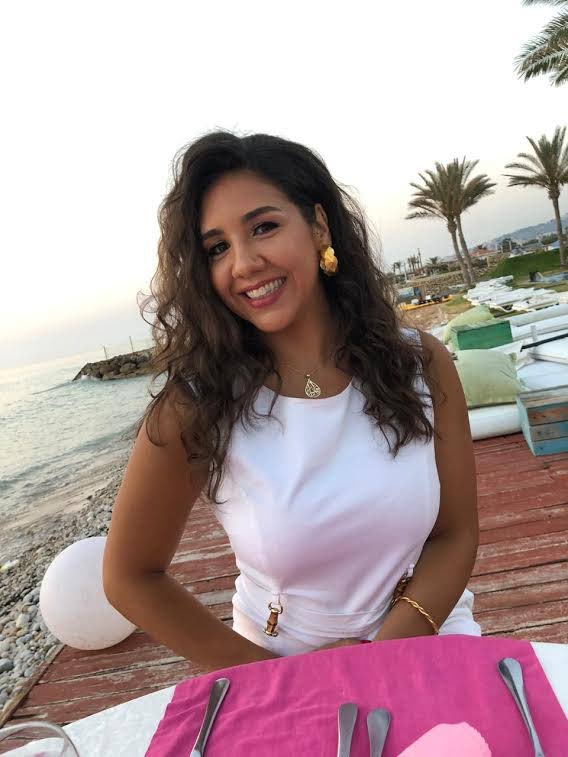
On August 4, Janelle Zakour found it "unbearably hot and too still to be indoors," she told Newsday.
There was a blackout, which was not unusual, in Beirut, where she lives.
"I couldn't take the heat any more and headed up the road to a coffee shop in Hamra to cool off with lemonade and attempt to charge my phone.
"As expected, there was no electricity there either. My fiancé followed me not long after."
Just after 6 pm they felt something like an earthquake, which lasted a few moments.
"Everyone in the garden with us looked at each other, confused. It was the longest five seconds of our lives.
"Then came the loudest sound I've ever experienced. And the world rocked. I was thrown completely backward from where I sat and was briefly deafened. I could barely hear my fiance screaming at me to move," Zakour said.
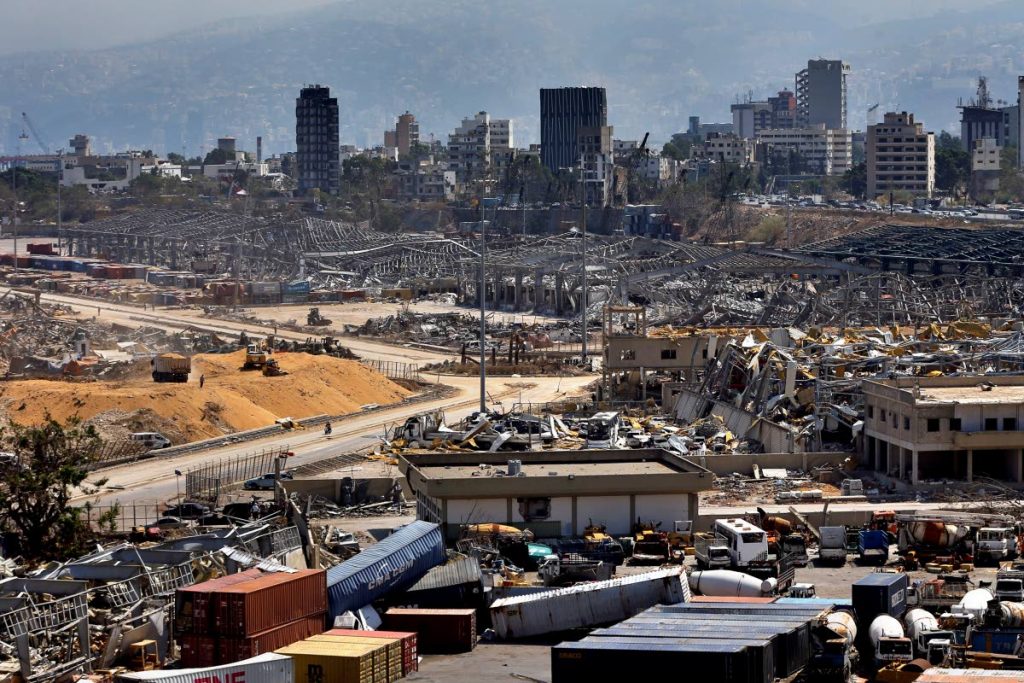
Rows of destroyed trucks and buildings are seen at the site of the August 4 explosion that hit the seaport of Beirut, Lebanon on Saturday. -
Immediately after the blast, she said, he threw himself at her and carried her inside, away from the window they were sitting under.
"Coming from a tiny island in the sheltered Caribbean," Zakour said, "I was not exactly certain what to do in the event of an explosion, much less one of this magnitude.
"This was one of those times where standing in a door frame was not going to be enough.
"I'm really too grateful for his quick thinking and reflexes that unfortunately came from prior experience. Lebanon does have a tragic recent history."
When the shaking subsided she said, they went into the street to survey the damage and "sleuth around for the cause.
"In hindsight, this may not have been the smartest move. Because what if there had been another blast? Our street was littered with glass, busted facades, parked cars crushed by fallen balconies and distraught and confused citizens walking aimlessly about salvaging what they can."
Many people initially thought it was a terrorist attack, she said.
Zakour and her fiance were just miles away from the two explosions that rocked the city. The second and far more powerful one caused at least 200 deaths, 6,000 injuries, between US$10-15 billion in damage, and left approximately 300,000 people homeless.
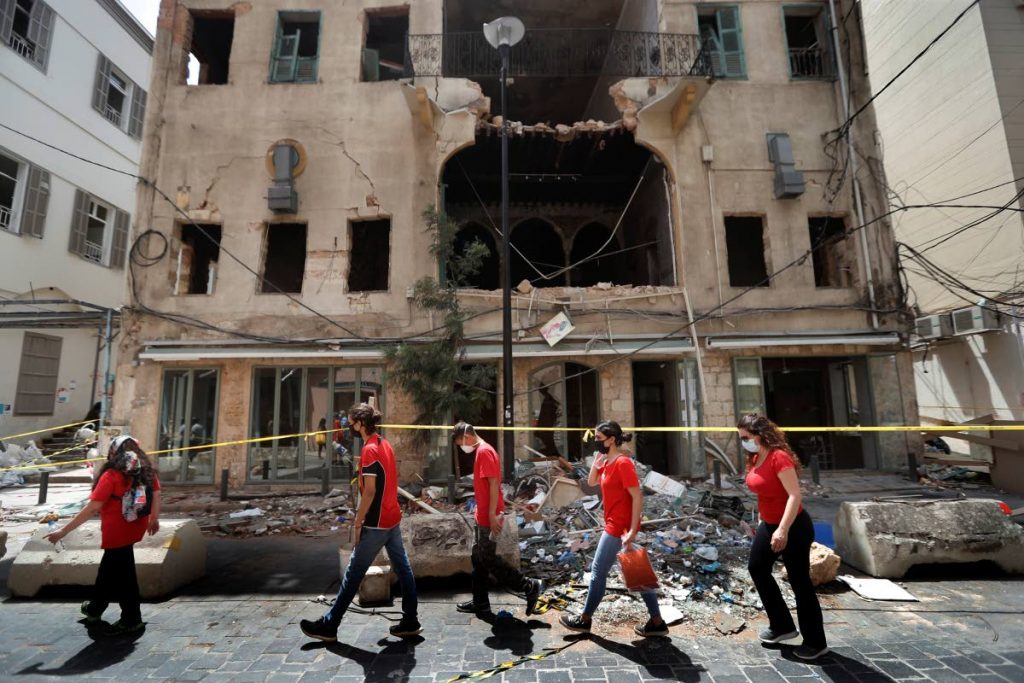
They were linked to about 2,750 tonnes of ammonium nitrate, which was confiscated by the Lebanese government and then stored in the port without proper safety measures for six years. The explosions were initially believed by many to have been a terrorist attack.
Zakour was traumatisingly close to the effects of the blast. She says she has never been more grateful to be alive.
"It was all very confusing. In a restaurant about 500 metres where we were, unsuspecting diners were enjoying an early dinner when they were showered with glass. There was blood everywhere."
Within minutes, she began receiving photos of bleeding classmates and their destroyed homes, but it wasn't until she returned home and watched the news that she learned there had been many deaths and injuries. Major hospitals were destroyed or badly damaged, but continued to take in victims of the blast.
"Half a million people were rendered homeless.
"The damage to my flat is so trivial compared to the rest of Beirut," Zakour said. "We were definitely some of the fortunate ones despite being so close."
She's no stranger to disaster, as a survivor of the devastating category five Hurricane Maria, which hit Dominica in 2017.
"It is a running joke in my family that I am in constant need of bush baths because of the situations that I find myself in. This is the second time that I've lived through something that is historically catastrophic and emerged physically unscathed. Call it divine intervention, call it luck...I am honestly just grateful to be here today."
Zakour explained life in Lebanon before the explosion, the experience in itself and the response, partly, she says, to give the "indifferent west" a better insight into Middle Eastern affairs.
"TT has its inconveniences, like, crime, inflation, potholes, water shortages, flooding, political divisions et cetera.
"These, by far, pale in comparison to what I have experienced living in Lebanon. We are really citizens in a paradise country and we do not know how good we have it."
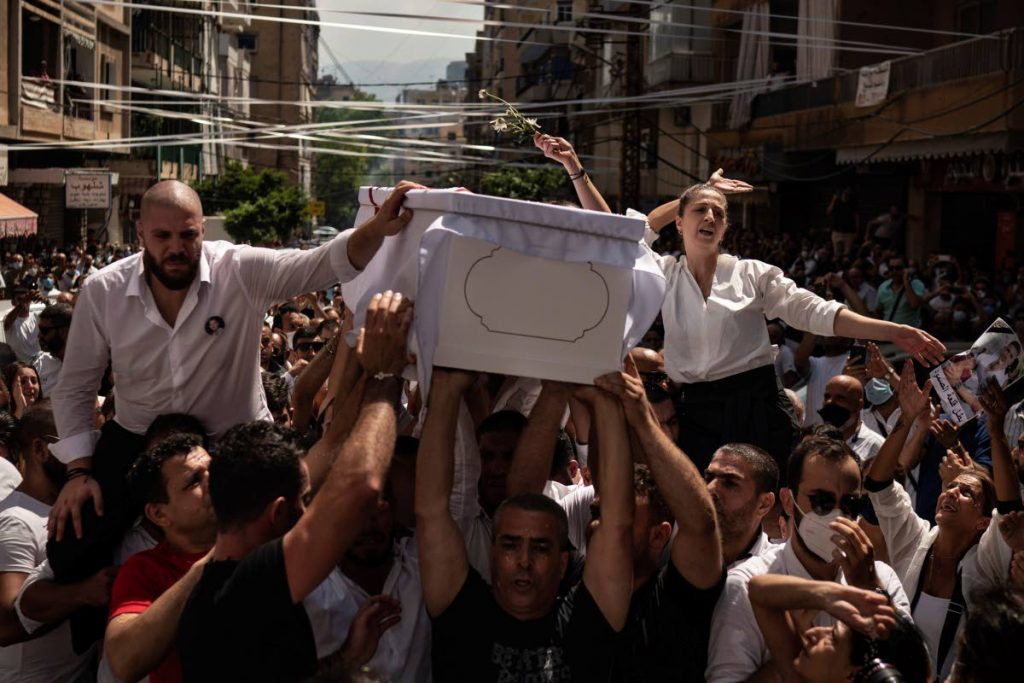
Zakour lives in Ras Beirut, a five-minute drive west of the port where the blast occurred.
"I moved to Ras Beirut from Mar Mikhael three months ago to be closer to my university and to be a bit further away from the consistent road closures brought about by the October revolution or
thawra (protests). Call this a blessing in disguise, but had I not moved, I may not be here today – Mar Mikhael is now completely flattened."
It's said that a silo next to the warehouse housing the explosive material shielded west Beirut from the damage that the eastern side of the capital experienced.
"Life has been anything but easy for the Lebanese people," Zakour said, noting the instability in the country caused by corruption.
"The straw that broke the camel's back was the proposition to tax WhatsApp, given that the platform was the only affordable means of communication in the country," she explained. "This led to the beginning of the
thawra, where thousands took to the streets to protest against the political elite who they claim are to blame for the decline in quality of life. Since the revolution began, the majority of the people were either put on half-salary or lost their jobs completely.
This, coupled with the Lebanese lira being devalued by 80 per cent, devastated the middle class and plunged millions into poverty.
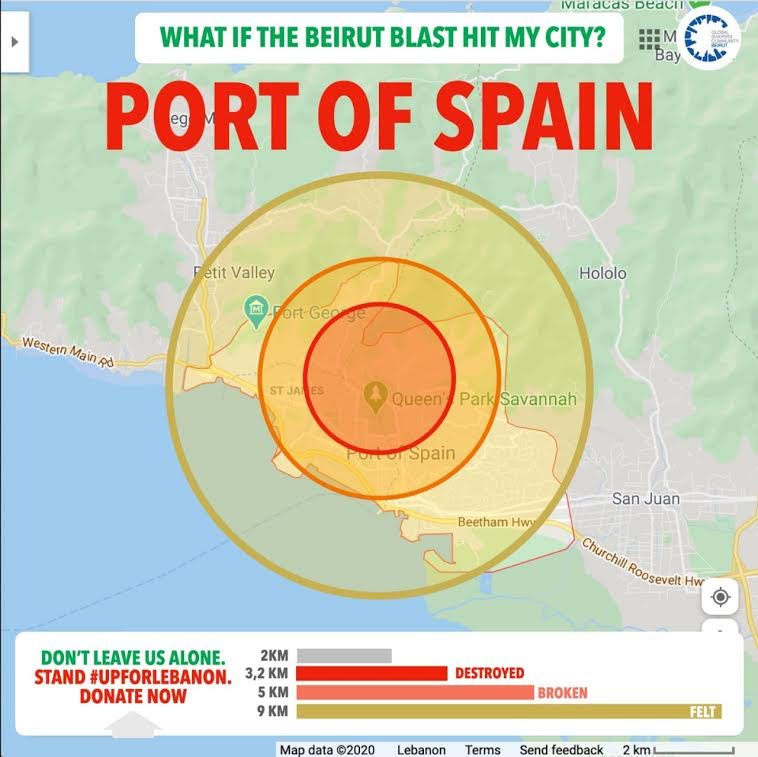
"The pandemic made this situation even worse."
She said the country experienced regular blackouts leading up to the explosion.
"At times we would have one to four hours of electricity a day. Not everyone could afford the luxury of a generator which relied on now costly and infrequently available diesel to run. It has been so hot in Beirut recently that there have been reported deaths from heatstroke alone."
Zakour is a member of the Port of Spain hub of Global Shapers, a Switzerland-based organisation, a network of young people driving dialogue, action and change. Global Shapers recently took on a campaign in which blast impact images were placed over about 400 cities around the world, to indicate the possible effect damage there.
Had the explosion which flattened Beirut happened at the docks of Port of Spain, almost the entire west of Trinidad would have been wiped out. It shows the blast would have flattened downtown and seriously damaged the city from St James to the Beetham Highway. The Beirut blast was felt up to nine kilometres from the explosion.
Aid is being organised for the affected Lebanese in a number of ways, including fundraisers set up by the Syrian Lebanese Women's Association.
Newsday reached honorary consul for Lebanon Amer Haidar, who was unable to account for Trinidadians affected by the blast because he had not received the information from the Lebanese government.
Newsday also asked him his thoughts on the resignation of the government, which followed the explosion. He said he would not comment as he was unsure if the resignation had been accepted. However, by then, President Michel Aoun had indeed accepted Prime Minister Hassan Diab's resignation.
Zakour told Newsday the Lebanese public is pleading with international donors not to donate directly to the government, for fear that the aid would not be distributed. She said the Global Shapers Port – an initiative of the World Economic Forum – is on the ground in Beirut and
working closely with the Beirut hub, which has partnered with an international NGO Anera to deploy emergency services there. Tax-free donations can be made at anera.org/donate-lebanon/
Alternatively, the registered NGOs Impact Lebanon, Lebanese Red Cross, Lebanese Food Bank, Beit el Baraka, Donner Sang Compter and Offre Joie are accepting donations.
"I am appealing to all citizens, especially to the Syrian Lebanese community of TT, for aid with this unnatural disaster. Because Trinbagonians are generous people, I am confident that some of us have already selflessly donated to the cause," she said, "Every dollar counts.
"The Lebanese people are wonderful and have proved themselves on multiple occasions to be true survivors and they are determined to rebuild their country in the hope of a brighter future."

Comments
"Trini-Lebanese survivor recalls Beirut blast"